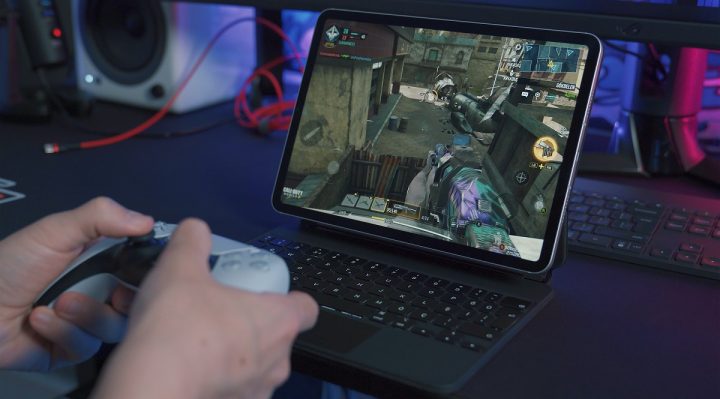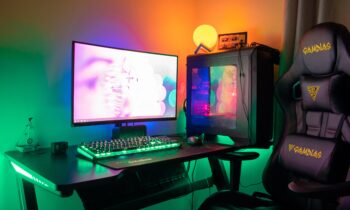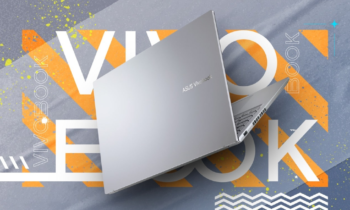Not sure whether to build a custom desktop or buy a laptop for the latest games? We’ve mentioned the pros and cons of both machines.
I own a gaming laptop and a gaming PC. I tested both and found something which I’m going to discuss here .
Gaming desktops

There is no doubt that desktops have been the best option for gamers since the beginning. Desktops offer convenient upgradability.
Pros of gaming desktops
Price
Gaming desktops can be cheaper than laptops of the same specs, but it also depends on the peripherals and components attached to them. Adding the latest GPU or a high refresh rate monitor can easily increase the price higher than a gaming laptop. Peripherals, like gaming mouse, headphone, and gaming keyboards, can also increase the cost of a desktop.
But it is not necessary that desktop’s are always cheaper than laptops, they have a better price to performance ratio. A powerful gaming PC might cost more than an expensive gaming laptop, but it will have better performance and a good monitor.
When we goal for long term costs between the two options, desktops come out on top. Laptops have limited upgrade options, users then have to replace the whole laptop with a newer model with the latest specs.
Desktops have a longer lifespan. Instead of replacing the whole setup, users can upgrade the parts gradually as new technology is released. If any component goes faulty, the users can also replace that component and continue using the system. But laptop owners have limited repair options.
Upgradeability
The reason for the popularity of desktops is their upgradeability. Most desktops allow users to upgrade components like RAM, Processor, GPUs, and storage drives. This factor is important because latest games are always getting bigger and require more resources for their high resolution graphics. Instead of replacing the whole pc, the users can only replace the components needed to run the games.
Upgradeability is directly proportional repairability. If any component breaks on a desktop, users can typically find a replacement for that. The ability to replace parts on a desktop PC extends its overall lifes and saves users money.
Customization and modularity
Prebuilt gaming PCs
Desktop PCs offer far more customization options than a laptop. Some companies allow users to choose every component and build their own desktop to the exact specifications they want. Users are free to choose everything from the case to the GPU and cooling system.
Pre-built gaming PCs from manufacturers, like Asus and Lenovo, offer limited customization options. Users get to choose high performance components, like GPUs, RAM, and processors, but they can’t select the cabinet and cooling options.
Custom built gaming desktops
Most gamers prefer to build their own desktop efficiently. The flexible design allows builders to choose all components ranging from the AIO cooler to the case and everything in between. Once all of the components arrive, builders are tasked with assembling the PC together.
Cons of gaming desktops
Mobility
Gaming desktop PCs are bulky and hard to move around. The cabinet tends to be heavy depending on the components it contains, and monitors become difficult to carry due to its size increase.
Space occupied
While this is generally the cabinet, there are some exceptions to the rule. Some users favor compact mini or micro-ATX builds with smaller cases. If these builds are paired with a smaller sized monitor, they become easier to transport than mid-tower ATX builds.
Gaming laptops

Gaming laptops offer portability and simplicity. Everything from the monitor , webcam and keyboard is integrated into a gaming laptop, so users don’t have to worry about buying them individually. Gaming laptops can run the latest Titles and they are the only options for people who often travel due to their compact design.
Pros of gaming laptop
Portability
No doubt, the biggest advantage of gaming laptops is their portability it self. Users can easily fit a laptop and it’s peripherals, like the mouse and headset, into a travel case and carry them anywhere.
Plug-and-play
Gaming laptops have integrated sound, webcams, monitors, keyboard and other devices, which make it easy to set up and use. Buyers get everything they need in a single unit and don’t have to worry about searching compatible peripherals to get the system running. That said, most gamers still buy aftermarket RGB mouse and headsets to get the best gaming performance out of their laptops.
Cons of gaming laptops
High price
While gaming laptops can be more expensive than desktop PC, it depends on many factors. The high costs of modern GPUs and the high refresh rate monitors can drive the price of desktops higher than laptops, especially when considering the other required components like mouse, headsets, and keyboards.
When factoring the long term cost, laptops have a higher price because they have limited repair and upgrade options as most of the components are embedded into the motherboard. Users can’t replace or upgrade those parts and they have to buy a new laptop when the current one gets old or develops a fault.
Gaming laptops costlier than gaming desktops alone. When WE COMPARE both options with similar performance, the laptop is almost always more expensive. That said, the price of desktop PCs can surpass the price of a laptop if you add a monitor, speakers, RGB keyboard, mouse, and headset.
Limited repairability and upgradeability
Most OF the gaming laptops offer limited upgradability. Users can upgrade the RAM and storage capacity, but components like the Processor and GPU can’t be replaced because they are integrated into the motherboard. While the desktop PCs are easy to open and upgrade, some laptops can be quite challenging to disassemble. Opening a laptop can void the warranty, so it’s better to refer to the user manual before attempting repairs.
The integrated components also make it harder to repair damaged gaming laptops once damaged can’t be replaced, so ultimately the user may have to replace the whole system instead of replacing the part if the unit isn’t under warranty.
Lower performance
Manufacturers have to scale down the component size to fit them into a laptop. Components like the CPU have a different design than a desktop processor. These parts are designed for a specific motherboard for a laptop instead of having a universal fit for all devices. There isn’t enough space in a laptop for a full-size desktop GPU, and mobile versions with comparatively lower performance are the usual answer.
Smaller screen size
Another area where gaming laptops lags behind gaming desktops is the screen size. While desktop users have many options regarding screen size, laptop users are limited to 15.6 or hardly 17-inch options. It’s possible to add larger monitors to a laptop, but it will increase the already high price of the system.
Which is better Gaming desktop or laptop?
If you are a hard core gamer or graphic designer and don’t care about how bulky it is, you have sufficient space for it and portability is not a constraint for you then desktop PCs are made for you .
On the other hand, gaming laptops are better option for people who require a portable solution. They are compact enough and allow users to travel around the globe . While they are expensive, there is no substitute for the gamer.




Nice comparison
Pingback: Gaming laptop buying guide - Tech Times Pro
very nicely explained , That is what i was looking for, Thanks for giving such valuable information.
Pingback: Are Gaming Laptops Good for programming? - Tech Ruled